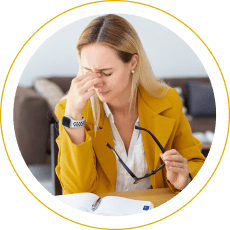Get Depression Treatment Online in 24 Hours
You might be going through difficult times, but they don’t have to last forever.
Get online help for depression: healthcare providers at MEDvidi are here to help you find the way toward remission.

Check Your Depression Symptoms Online
The Beck Depression Inventory (BDI) is a commonly used assessment developed by Aaron T. Beck. The psychometric questionnaire helps to assess the severity of symptoms, evaluate the probability of having depression, and monitor the dynamics of mental state over time.
The multiple-choice test includes 21 statements. Please read each of them carefully and choose the answers that best describe your state. When answering, only include the period of the past two weeks, including today.
How We Work
Create an account, provide basic health information, and choose a convenient date and time for your appointment.
Consult with a licensed medical professional who can diagnose depression online. Get personalized treatment, including an online prescription for antidepressants, if deemed necessary.
Regular appointments help to monitor your progress and enable the provider to adjust your treatment plan and refill your prescription if required.
Our team of experienced clinicians uses evidence-based approaches to depression treatment. See a medical provider in 24 hours.
Why Choose MEDvidi?
-
Medical experts licensed to work in your state and available online
-
Comprehensive treatment plans
-
Evidence-based treatment for depression tailored to your symptoms and needs
-
Online appointments within 24 hours
-
Follow-ups and mental health support during the whole treatment process
-
Online and timely medication management
We monitor the latest advances in depression treatment to offer suitable strategies and help you on your mental health journey.
Get Help for Depression Online
- An online 30-minute visit
- Symptoms check
- Identifying treatment goals
- Developing a treatment plan
- Prescribing medications if necessary
- Regular 15-minute visits
- Symptoms monitoring
- Prescription refill
- Treatment adjustments
- Working on thinking and behavioral changes
Our Medical Team Can Treat:
Major depressive disorder (MDD) is described as a persistently low mood that influences one’s day-to-day life. Its common symptoms are loss of pleasure in activities, apathy, anxiety, changes in appetite, sleep problems, ruminations, etc. Major depressive disorder treatments include talk therapy sessions, medications, or their combination.
SAD occurs during a specific time of the year. Lack of sunlight and other climatic factors may cause hopelessness, irritability, sleepiness, social isolation, and fatigue. Apart from standard medications and talk therapy, light therapy may be prescribed.
What does depression treatment involve?
Treatment plans for mild, moderate, and severe depression may vary and are highly personalized. The difference may be in the number of talk therapy sessions, the choice of suitable antidepressant medications, and more. Always consult a healthcare provider to get the right treatment.
What type of treatment for depression is available at MEDvidi?
At MEDvidi, you can get help for depression online: see a licensed healthcare provider for an assessment and diagnosis and receive a treatment plan, including medication prescription, if deemed appropriate. Studies have shown that online treatment is effective and complements offline services.
Depression Symptoms
The signs of depression may slightly vary, mainly including the following:
- Hopelessness and sadness
- Apathy and anhedonia
- Low energy levels and low motivation
- An irrational feeling of worthlessness
- Anxiety and difficulty concentrating
- Memory problems and slowed thinking
- Anger and irritability
- Unexplained aches and pains
- Weight gain or loss of appetite
- A lack of sleep or oversleeping
- Suicidal thoughts in extreme cases

Go through a detailed assessment online and receive personalized recommendations.
What causes clinical depression in adults?
The most common causes of depression in adults include experiencing stressful or life events; prolonged personal, professional, or financial issues; some medical conditions; brain chemistry and genetics. Consult with a healthcare provider to learn what could cause the symptoms of depression in your particular case.
Why is it important to identify and treat depression?
Early diagnosis and proper depression treatment increase the chances of achieving remission and prevent relapses. If left untreated, depression may result in challenges at work and in relationships, physical illnesses, risky behavior, and addictions.
How is depression diagnosed and treated?
Diagnosing depression requires a comprehensive psychological evaluation conducted by a licensed professional. During such screening, the patient’s symptoms and their duration are analyzed and compared to the criteria mentioned in the DSM-5 (Diagnostic and Statistical Manual of Mental Disorders, Fifth Edition). In some cases, you may also be asked to go through a physical exam and lab tests to rule out other conditions. When it comes to treatment, the combination of psychotherapy and medications has proven to be the optimal treatment for clinical depression.
Medical Treatment for Depression
Patients with major depressive disorder who are experiencing moderate to severe symptoms may be recommended to try a pharmacologic treatment for depression.
There are different types of antidepressants, and healthcare providers choose the most suitable option according to the symptoms and health history.
Types of Antidepressants Available Online
Antidepressants are prescription medications used to treat depression and other related mental health conditions. They work by targeting imbalances in certain brain chemicals called neurotransmitters, particularly serotonin, norepinephrine, and dopamine. These medications can help improve mood, reduce depressive symptoms, and restore a person’s overall sense of well-being.
Types of Antidepressants
Atypical antidepressants target the modulation of neurochemicals like noradrenaline, serotonin, or dopamine in the brain via different mechanisms. An increase in neurotransmitter levels corresponds to improved mood and functioning.
- Remeron (mirtazapine)
- Wellbutrin SR & XL (bupropion)
- Trintellix (vortioxetine)
- Trazodone
- Nefazodone
Tricyclic antidepressants (TCAs) affect the reuptake of serotonin and norepinephrine. However, they are less commonly prescribed due to their potential side effects and overdose risks.
- Pamelor (nortriptyline)
- Norpramin (desipramine)
- Protriptyline
How to Get Antidepressants Prescribed Online
Obtaining a prescription for antidepressants requires several steps:
- See a licensed healthcare provider who can evaluate your mental health state and make a diagnosis.
- Discuss your symptoms and their impact on your daily life.
- Discuss the available treatment options and ask about potential benefits and side effects.
- If deemed medically necessary, you’ll receive an online prescription and detailed instructions

Personal Portal: Everything you need in one place
- Easy scheduling: Schedule a visit from your couch, any time, no waiting in line!
- Comprehensive visit management: Reschedule your appointment in a few clicks.
- Plan in advance: No forgetting to schedule that follow-up next month!
- Track your prescription online: Check your prescription status anytime and know when the medication is ready to pick up.
- Switch pharmacies: Your chosen pharmacy doesn't have your medication? Select another one in a minute.
- Save personal details: No need to repeatedly fill out personal and medical information. Just choose a date and time to book a visit.

Advantages of Online Prescriptions
- Fewer errors in medications names and dosages
- Easily accessible prescription history
- Wider availability of services
- Shorter wait times
- No need to visit a clinic every month
- Smooth workflow, as new online prescriptions may be delivered directly to pharmacies.

| MEDvidi Mental Telehealth | Traditional Clinics | |
|---|---|---|
| Cost of an initial visit | $195 | $400-500 |
| Having appointments within 24 hours | ||
| Booking or rescheduling visits in a minute | ||
| Scheduling multiple visits in advance | ||
| Saving time on travel | ||
| Video appointments from home or any location | ||
| Online prescription refills and treatment adjustments | ||
| Fast and caring responses from the Care Team | ||
| Over 60+ medical providers experienced in mental health treatment |
See One of Our Experienced Providers
Useful Materials
Self-diagnosis is not an option when it comes to depression. Only a licensed healthcare professional will make a correct diagnosis after a thorough assessment of your health history.
Knowing the warning symptoms and mastering supportive self-help techniques is beneficial. Use trusted resources to learn more about depression and discuss it with your healthcare provider during your online visit.

Depression Can Be Treated
FAQ
What is the number one solution for depression?
The treatment of depression often requires a comprehensive approach tailored to each individual’s needs. It may involve a combination of strategies, including professional mental health support, medication treatment, lifestyle changes, etc.
How can I legally get antidepressants?
Antidepressant medications are available only by prescription from a licensed healthcare professional. The first step is to consult with your healthcare provider who can assess your symptoms and make a diagnosis. If they determine that antidepressant medication is necessary, they will write you a prescription or send it to your pharmacy of choice digitally. Remember to follow safety instructions provided by your clinician during the whole course of treatment.
Can telehealth doctors prescribe antidepressants?
Yes, licensed and authorized healthcare providers can prescribe antidepressants online if deemed necessary for a patient based on the symptom assessment and diagnosis.
Can I buy antidepressants without a diagnosis?
No, antidepressants are prescribed only if your healthcare provider makes a diagnosis and determines the need for such medications. Antidepressants have certain side effects and have to be used under the supervision and guidance of a qualified healthcare professional.
Are there over-the-counter medications for depression?
There are currently no over-the-counter medications specifically approved for depression.









